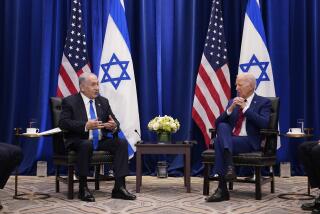Barak and Shareh Dine as Peace Talks Wind Down
- Share via
SHEPHERDSTOWN, W. Va. — President Clinton, Israeli Prime Minister Ehud Barak and Syrian Foreign Minister Farouk Shareh ate dinner together Sunday night--the first time in half a century of animosity that Israeli and Syrian leaders have shared a meal, the traditional Middle East ceremony of trust and peace.
Clinton flew by helicopter to this West Virginia college town to host the dinner a few hours after lower-level Israeli and Syrian diplomats began negotiating over future borders and Israeli withdrawal from the Golan Heights, the strategic plateau that Israel captured from Syria in the 1967 Six-Day War.
A committee of experts charged with addressing the border issue convened Sunday, ending a long procedural delay that had begun to resemble a deadlock. The panel was the last of four to begin its work.
The other three committees--with jurisdiction over security arrangements, water rights and “normalization” of relations--met earlier in the day. The security and normalization committees had also met earlier in the 7-day-old conference.
Officials representing all three delegations said the current phase of the Israel-Syria peace process probably will end today with no agreements in hand. Still, U.S. officials said the longtime antagonists have developed a businesslike attitude that seems to be bringing them closer to peace than at any time since the creation of modern Israel.
“We have avoided procedural breakdowns, and we’ve accelerated now the work pace, so that we’re quite satisfied that the two sides are wrestling with these difficult issues in an organized way so that we can see that an agreement is possible,” State Department spokesman James P. Rubin said.
Since Friday, the Israelis and Syrians have been studying a seven-page U.S.-drafted document underlining areas of agreement and summarizing the position of the parties on a far longer list of disagreements. Rubin said the document could be “a starting point” for a treaty, although much more work remains to be done.
Barak and Shareh are expected to head home late today, possibly leaving the four committees to continue their talks, either here or somewhere else in the Washington area. Rubin said the Clinton administration expects full-scale negotiations, with Barak and Shareh participating, to resume “sooner rather than later,” but he gave no hint of when that might be.
With the talks winding down with no concrete agreements, U.S. officials took steps they clearly hoped would sweeten the atmosphere between the bitter enemies. Sunday’s dinner was by far the most important.
Barak, Shareh and Clinton were accompanied by their top aides at the dinner, which featured roast tenderloin of beef, a salad with goat cheese and a dessert of poached pears, mixed berries and cinnamon ice cream. Two wines were served.
“I think the president believes it is important to bring the leaders together in a number of different settings to try to bridge the differences, and this is part of that process,” White House press secretary Joe Lockhart said.
On Tuesday, Clinton had played host to a half-hour party for the three delegations. But, perhaps because of the symbolic importance attached to breaking bread, there was no food, and only nonalcoholic beverages were served.
In addition, Secretary of State Madeleine Albright entertained Barak and Shareh--separately--at her farm in nearby Hillsboro, Va., and escorted them, one at a time, to some of the tourist attractions in the area.
Rubin said Albright had tea with Shareh at Hillsboro on Saturday. On Sunday, she escorted Barak and Israeli Foreign Minister David Levy to the Antietam battlefield in Maryland, where 22,728 Union and Confederate soldiers were killed or wounded Sept. 17, 1862, the bloodiest single day in U.S. military history.
Speaking to reporters in Hebrew at Antietam, Barak said: “There is no doubt that the negotiation is difficult. The negotiation is very complex. We will not sign an agreement unless, in our opinion, it will strengthen the security of Israel and address its vital needs.”
In Jerusalem, Haim Ramon, a Barak Cabinet minister without portfolio, told Israel Radio that the American document was significant because it “brings the negotiations down to reality” and for the first time clearly outlines the points of agreement and disagreement between the parties.
*
Times staff writer Rebecca Trounson in Jerusalem contributed to this report.
More to Read
Sign up for Essential California
The most important California stories and recommendations in your inbox every morning.
You may occasionally receive promotional content from the Los Angeles Times.













